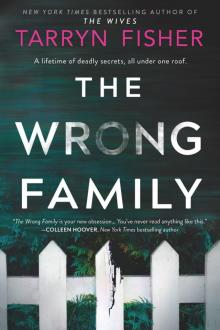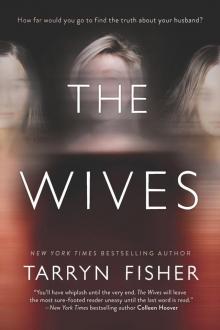- Home
- Tarryn Fisher
The Wives Page 15
The Wives Read online
Page 15
“Hasn’t the doctor spoken to you about this?” Phil scratches over his left nipple and flips another page.
I shake my head.
“He should be over in a bit and he’ll discuss it with you then.”
“Great,” I say dryly. I’m sour. I don’t like Phil. He is obviously ex-military and thinks everything should be done a certain way: discipline and order. I want a young, easily manipulated nurse like Sarah, who will feel sorry for me.
Before Phil leaves, I ask if I can make a call.
“To whom?”
“My husband,” I say sweetly. “He’s working in Portland and I’d like to check on him.”
“There’s no husband listed in your chart,” he says.
“Are you calling me a liar?”
Phil ignores me. “Why don’t we leave the checking in up to him? After all, you’re the one in the hospital.”
I glare at him as he leaves the room. I used to like guys like Phil—they were helpful in sticky patient situations, always willing to play bad cop when a nurse needed a break—but being on this side of a Phil is a terrible thing. I’ll wait for the next nurse and hope she’s more my type.
* * *
Dr. Steinbridge tells me that all is well in my head, nothing swollen or bruised.
“Looking good, looking good,” he says, tapping a bent finger against my chart. His knuckles are dusted with white hairs. “We’re transferring you to the psych ward, where you’ll have your evaluation and we’ll get your new medication sorted out.”
“Wait a minute,” I say. “I don’t need to go to the psych ward. I’m fine. I fell and hit my head.”
His lips fold in like he’s disappointed with me.
“You’re having extreme delusions, Thursday. Violent outbursts. Don’t worry,” he tries to reassure me. “We’ll work on getting you better. We all want the same thing.”
I doubt that. Seth wants me in here. I want to scream, swear at him...force him to see the truth, but I know that if I do I’ll only confirm what he’s thinking...what Seth’s telling him. I’m not crazy. You’re not, I tell myself. Even when you feel like you are, remember you’re not.
An hour later, a nurse pushes a wheelchair into the room and flips on the brakes.
“I’m here for your transfer,” she says.
“My husband...?” I hate the whine in my voice, hate that I have to ask where my husband is instead of knowing.
She shrugs. “I’m just here for your transfer. That’s all I know.”
I feel woozy as I walk over to the chair. The backs of my legs hit the soft leather and I sink down in relief. It’s not the head injury making me feel this way, it’s the drugs. I can barely think clearly. I don’t remember the wheelchair ride up to the eighth floor, or getting into the bed in the tiny room. I’m assigned a nurse, but I have no recollection of her coming in to see me. Nothing feels real. I question my existence, I question Hannah’s... Did I imagine everything, like they said? I want to talk to Seth, I want my head to clear, but they keep pouring pills down my throat.
* * *
I spend the next seven days in a sort of haze. Nothing feels real, the drugs making me feel detached from my body: a limp helium balloon bobbing about a room going nowhere. I go to group, eat my meals in the dining hall and see Dr. Steinbridge for sessions. I’ve lost so much weight that I don’t recognize myself when I look in the mirror. My jaw has definition and there are hollows above my collarbone, deep compressions that were once filled with fat. How can a week do this to a person? I wonder, but I’m not sure I care. Everything is muted, even my feelings about myself.
I stop asking about Seth after a few days; even the thought of him makes me feel desperate and crazy. The nurses look at me with pity in their eyes. I have the vague feeling that I don’t like it when they do that. They probably don’t think there is a Seth. And maybe there isn’t. Also, fuck him for putting me in this position where I am questioning myself.
On the ninth day, my mother comes to see me. Visiting hours are in the common area, where all of us crazies wait eagerly for our people to arrive. We sit on mustard-colored couches or at the gray tables on foldout chairs, our hair greasy and our faces pale and splotchy from too little or too much sleep. An attempt at normalizing the room is made with potted plants and framed artwork. I’ve studied each piece of art and the plaques next to them telling of the local artists who painted, or sketched, or photographed. Seattle likes to keep it local, homegrown artists to soothe the homegrown sick.
I find an unoccupied couch near the vending machines. They won’t allow us caffeine or too much sugar. The machines are stocked with vitamin water and bruised-looking apples. I sit with my hands in my lap, staring at the floor. When my mother walks in, she doesn’t recognize me at first. Her eyes move right over my face, then bounce back like they’re on a bungee cord.
I see her mouth my name before she clutches her purse tightly to her side and scurries over. I stand as she approaches. I’m not sure if she wants to hug me or if she’s too disappointed. The first time I landed myself in a psych ward, she refused to come, saying it was too painful to see me that way. Too painful for her. Now she lowers herself onto the sofa without taking her eyes from my face.
“Your father—” she starts.
“Yeah, I know, Mom. It’s fine.”
We look at each other like it’s the first time we’re truly seeing each other’s faces. My father would never come to a place like this. To see one of his daughters locked in a psych ward would mean that he had done something wrong as a parent, and my father likes to maintain the illusion of perfection. As for my mother, I am her crazy, unhinged offspring—she gave birth to me and has no idea of who I am or of the life I live. She doesn’t want to know. We’re both thinking the same thing. I pull my sweater down over my hands as I gaze at her Botoxed forehead. She doesn’t want to admit how old she is any more than she wants to admit that her daughter is a first-class fuckup.
“I’m not here because I’m crazy,” I tell her.
She immediately opens her mouth to deny she’s ever had that thought. Of course, that’s her job as a mother.
“I’m not sick, either. I’m not having an emotional breakdown because I lost my baby a year ago.” I cut off all the roads her mind is taking, all the ways she’s trying to make excuses for why I’m here.
She closes her mouth and stares. I feel like a child as my bottom lip quivers. She won’t believe anything I say. Seth has already gotten to her.
“Mom, Seth already had another wife when I met him. Her name is Regina Coele. She didn’t want children. I was the one who was supposed to give him a baby. But then I had the...” My voice trails off.
My mother drops her head like this is all too much. I watch the tips of her lashes, the bridge of her nose, as she stares down at her shoes. From this angle she looks ten, twenty years younger. Just a girl who has bent her head in exasperation...frustration...hopelessness? I’ve never been good at telling what she’s really feeling. I know all of the brands she likes, I know her thoughts on shallow, useless topics, but I don’t know how to uncover what she’s truly feeling. I’m not quite sure if she knows, either.
“Regina is Seth’s ex-wife. He was married before you, yes. You’re right—she didn’t want children and so they parted ways.” My mother leans forward, her eyes imploring. It’s true. How can I argue with that? Regina is technically his ex-wife. He divorced her to marry me, after all. But they’re still together, still a couple, just without the title.
“Mother,” I say. “Please listen to me. Seth is trying to cover his tracks. They’re still together.”
She drops her face into her palms. When did I become the type of woman who isn’t believed by her own mother? When you started lying to yourself, I think.
When she looks up, her eyes are wet. She reminds me of a cocker spaniel with those wet eyes. “
You have an unhealthy fixation on his exes. But, Thursday, he’s not with them. He’s with you. Seth is worried sick about you.” She reaches for my hand, but I pull it away. I won’t be coddled that way—spoken to like I’m a child. Her hand drops uselessly back into her lap.
“Why do you think he’s always in Portland? He has two other wives.” I stand up, begin pacing.
“He works there,” she hisses. “He loves you, we all do. We want you to get well.”
“I am well,” I say stiffly. I stop to glare at her. “Why hasn’t he come? Where is he?” That’s when she gets shifty, averting her eyes, crossing and uncrossing her ankles. She doesn’t know what to say because she doesn’t know where Seth is, or why he hasn’t come.
“In Portland...” she says. It sounds more like a question. “He still has to work, Thursday. Life goes on.”
“No, it doesn’t. Not when I’m in the hospital. He has other wives to tend to his needs,” I say. “Why come see the loony toon in Tonker Town?”
She looks at me quizzically for a moment before she stands up. We face each other and I can read the disappointment on her face.
“I need to get going,” she says. Fifteen minutes. She lasted fifteen minutes in the psych ward. I watch as she retreats toward the doors, her shoulders sagging with the weight of my failures as her daughter. At least this time she came.
TWENTY-ONE
I am alone. I realize that it’s always been this way, my whole life, and anything my mind constructed to convince me otherwise was a lie. A comfortable lie I needed. My parents were occupied with my sister, Torrence, who was always getting into trouble at school or with her friends. I was the good child; I parented myself well while they were busy. I knew the rules, the moral confines they’d built around me: no drinking, no premarital sex, no drugs, no sneaking out, top-notch grades only. It was easy to follow their guidelines; I wasn’t the rebel of the family. My sister, on the other hand, dabbled in all of the above. My father grayed at his temples, my mother started getting Botox and I tried my best to be perfect so there was one less daughter to worry about. Then, when Torrence straightened up and married the right man, they’d been so relieved they’d showered her with a different type of attention. She’d put in three well-behaved years and they’d both forgotten the decade she spent snorting their money up her nose and fucking every dealer in town. Maybe all of that trying made me go crazy. Maybe the lack of attention from my parents pushed me toward Seth, my desperation to be accepted trapping me in a relationship any normal person would think bizarre.
I poke at my Jell-O. They love to feed you Jell-O in this place—wobbly and colorful, like our minds. Today is orange, yesterday was green. It’s like they’re trying to remind you that you’re weak and unstable. I eat my Jell-O.
I have to get the fuck out of here. I have to find Hannah, make sure she’s okay. Where once I slept, I am now awake. I saw Dr. Steinbridge today. I’ve realized that he is my keeper—not the electric doors with keycard access, nor the burly nurses who wrangle us like toddlers if we get out of hand. Calm down, little Thursday, or we’ll put you in the padded time-out room.
Dr. Steinbridge has the power to say I’m well; he is God in this place of speckled sterile tile and fluorescent lights. One swipe of his pen (a Bic) and I am a free bird.
Hannah... Hannah. She’s all I think about. I’ve become her savior in my own mind. If something has happened to her, I am responsible. If she is to be saved, I must get out of here. I married this man, gave my blessing for a third wife. When I saw that first bruise I should have spoken up, forced her to tell me what he did. For a moment, I doubt that she is real. That’s how good they are—they can make you doubt your own mind in this place.
Eat your Jell-O!
I realize it is my duty to convince the good doctor that I have come to my senses, that my head is cleared of its delusional fog. That I am whole and my husband is a one-woman man! That Hannah and Regina are not real, but a sexual game my husband and I played. That’s what they want to hear, isn’t it? All I have to do is say I’m lying about Seth’s penchant for plural pussy and I am a cured woman!
It can’t happen too fast, my change, or Steinbridge will suspect that I am lying. During our daily sessions, I pretend to be confused. Seth only has one wife? That wife is me? Gradually, I become more myself, each session I am less confused, less insistent.
“What is wrong with me?” I ask the doctor. “Why don’t I know what’s real and what is not?”
I am diagnosed! The trauma of losing a child, never dealing with that loss in a healthy way, it put stress on my relationship with Seth. I blamed other women instead of focusing on my healing. When the good doctor asked what I thought triggered the mania that led to my mental demise, I thought of Debbie: chatty Debbie, nosy Debbie, Debbie with the big hair who suggested I snoop on the women who made me feel insecure. I don’t blame Debbie for any of my actions; if anything, she woke me up. I wasn’t the only one who suffered crippling insecurity, you could be any age. Hell, Lauren seemingly had a perfect life. I always thought she taped those anniversary cards to her locker to brag, to rub it in the rest of our faces that she had it better than us. But now I see the truth: women are stuck in a cycle of insecurity perpetuated by the way men treat them, and we are constantly fighting to prove to ourselves and everyone else that we are okay. Sure, women occasionally lose their minds over men, but does that mean we’re all unstable, or that men made us unstable with their careless actions? I don’t tell Dr. Steinbridge about Debbie or Lauren; he would say I was deferring responsibility. But that’s not what I’m doing at all; I’m holding everyone accountable, because it takes a village to put someone in a mental institution.
My lack of dealing with issues is part of my unraveling, according to Dr. Steinbridge. I like the way that sounds: my unraveling.
But I’m not unraveling in the way they think I am; I’m unraveling out of my infatuation with my husband. I play the part of frail, painfully unaware woman. Stress has eaten at me, I have no coping mechanisms, my parents’ lack of attention coddled me into a tight, naive little cocoon.
We take a tour of my daddy/mommy issues. My mother is a pleaser and my father is detached. As I watched my mother do more, more, more to earn my father’s attention...well...I learned to express that love language. And when I do too much, I collapse under the weight of expectations. My empty womb has made me feel like I’m not a real woman, not worthy of my husband’s love. They scraped all of my organs out, roped off my reproductive system: closed for business. Before my eyes, scenes from my miscarriage begin to flash in painful succession. I know I’m supposed to let them come, face them—as the doctor says. But they’re memories I’ve never looked over, not even once, since it happened. It’s easier to cope when you don’t acknowledge what you’re coping from.
* * *
Seth and I have just left our bed and breakfast, and we stop at a gas station to fill up and buy snacks for the road. We’ve just eaten but he insists the baby will need snacks, which makes me smile. He’s so attentive: buying little gifts and kissing my swelling belly. One of my friends at the hospital told me that her husband is revolted by her pregnant stomach and refuses to touch it. I watch him through the car window, my heart swollen with pride. My husband, mine. And now we’ve made a baby together; my life couldn’t be more perfect. He’s so handsome as he walks toward the car, carrying two paper cups, a plastic bag hanging from his forearm. The cups hold tea; he says he asked for hot water inside and then used his mother’s tea bags. It’s bitter, but I’ve been drinking it for a week and the taste is growing on me. I dig in the bag while he finishes up with the gas. He’s bought my favorite pregnancy snacks: unhealthy, processed garbage that normally make me blush with shame. But as I sip on my tea and pull things out of the bag, I feel only grateful for my thoughtful, observant husband. So sweet are the ranch-flavored chips and licorice sticks that resembled twisted, red plastic.
The cramps start an hour and a half later. I don’t want to say anything at first, remembering that my doctor said that some women experience Braxton Hicks contractions early in their pregnancies. The phantom pains a mere reflection of what is to come. I squirm uncomfortably in my seat, my open bag of chips falling to the car’s floorboard, little speckled triangles spilling out around my shoes. It’s not until I bend to retrieve the chip bag that I see the blood. It’s pooling on the tan leather, staining my cream pants in a dark, ominous red. “Seth,” is all I have to say. He looks over at me and pushes his foot down on the gas, his face pale at the sight of the blood. The nearest hospital: Queen County. When we pull up at the doors of the emergency room I already know my baby is dead, his life leaking out from between my legs.
* * *
Everything from there I could only recount in a sort of dizziness that was colored by fluorescent lights. The first time I had clarity of mind after the car ride to the hospital was five days later when they told me that my uterus had ruptured and in order to control the bleeding they’d had to remove it in an emergency surgery. I would never be able to become pregnant again. I’d let Seth hold me as I sobbed into his shirt, and then when he’d left to take a call from work, I’d gone to the tiny bathroom in my room and attempted to slit my wrists with a metal nail file. A nurse found me bleeding on the floor, staring at the blood, perfectly calm. It was a hack job, my wrists sawed open with something dull. The scars are thick and lumpy. I’d been calm until they tried to help me, then I scratched, and bit, and screamed that they’d killed my baby and were trying to kill me. That had been the start of my first stay at Queen County. The stay that had left me barren of womb and heart.
Dr. Steinbridge says that, in my grief, I created the delusion of three wives—women who were better suited for Seth, ones who could give him what I could not. God, it’s depressing all the things that are wrong with me—even if only half of them are true.

 Jackal
Jackal F*ck Love
F*ck Love Mud Vein
Mud Vein Thief
Thief Marrow
Marrow Dirty Red
Dirty Red Folsom
Folsom The Opportunist
The Opportunist Atheists Who Kneel and Pray
Atheists Who Kneel and Pray Bad Mommy
Bad Mommy The Wrong Family
The Wrong Family The Wives
The Wives Jackal (The End of Men Book 2)
Jackal (The End of Men Book 2) Folsom (The End of Men Book 1)
Folsom (The End of Men Book 1) Thief (Love Me With Lies #3)
Thief (Love Me With Lies #3)